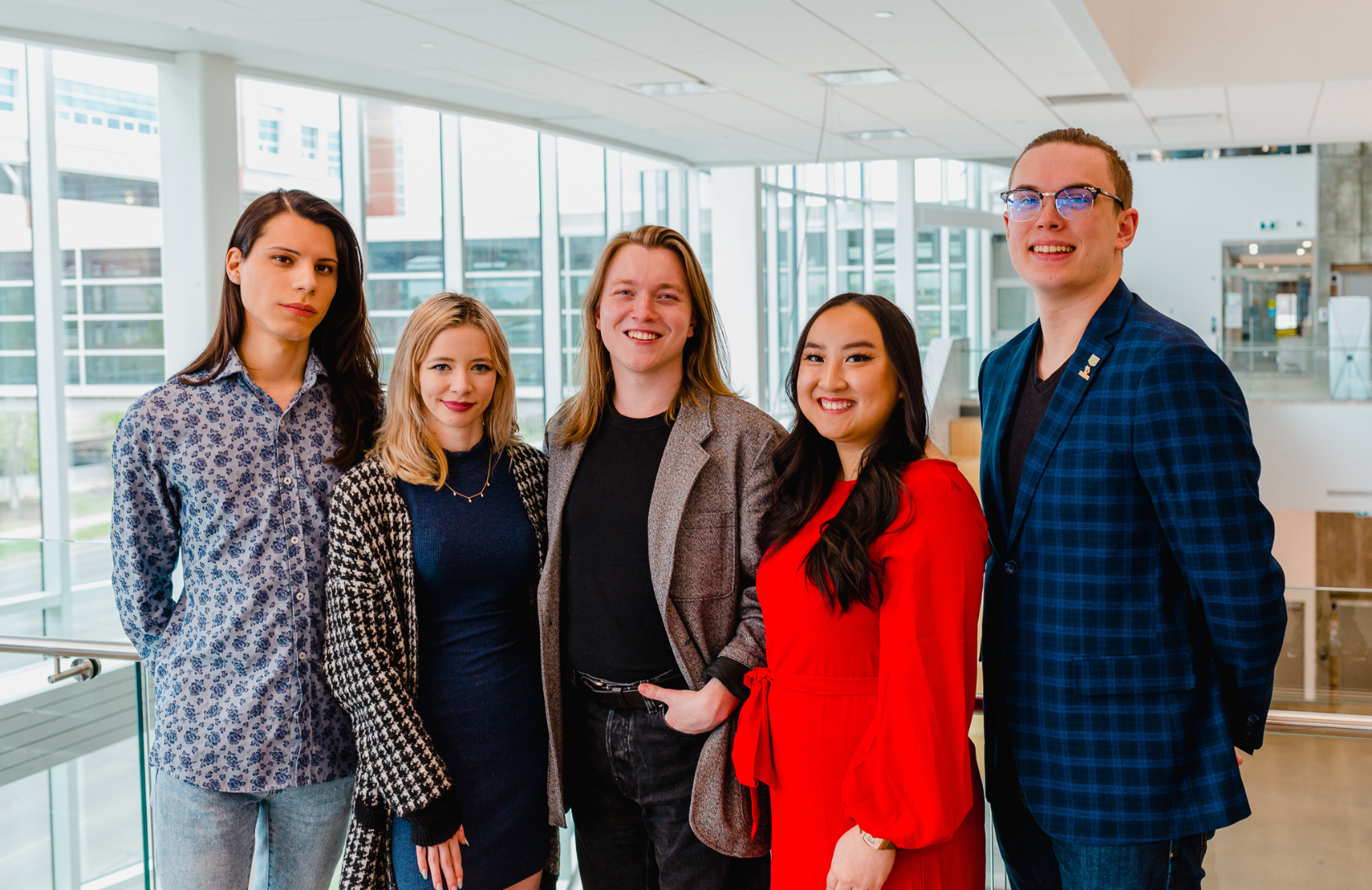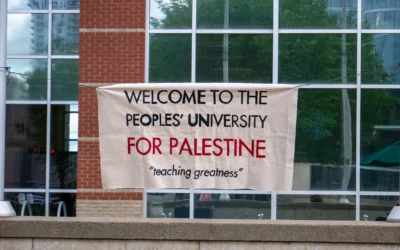At MacEwan University, your interests as a student are looked out for by Students’ Council and the Executive Committee (EC). Students’ Council is the highest governing body within the Students’ Association of MacEwan University (SAMU), and it consists of 14 student councilors and five EC members who draft policy and bylaws for SAMU.
The EC consists entirely of students who are elected by the MacEwan student body once a year. The EC does a lot of advocacy for MacEwan students, listening to their needs through focus groups, surveys, one-on-one meetings, and formal and informal consultations. They also oversee day-to-day operations on behalf of the Students’ Council.
This year, your EC consists of president, Myles Dykes; vice president academic, Stephan Vasquez; vice president operations and finance, Larissa Williams; vice president student life, Elaine Tran; and vice president external, Matthew Yanish. Dykes, Williams, and Yanish, have been re-elected to the EC, and Tran and Vasquez are serving their first term.
Dykes was unable to attend the interview, but I spoke with the other four EC members to understand their goals this year, get a glimpse into the projects they’re working on, and learn about their goals for the 2022/23 terms.
What responsibilities do you have on EC?
Elaine Tran, VP student life:
“Being in the student life portfolio, a lot of my advocacy focuses on social issues,” says Tran.
“In terms of direct support, I really think that it’s important for students to know that we’ll have office hours. With the return to campus, you can book those office hours and come meet with us,” she says. “And for me personally, that means just being able to connect with students about how to make the most of their experience here in the four to five years or however long they spend on campus.”
Stephen Vasquez, VP academic:
“As Vice President Academic I… sit on all the committees (related to) academic affairs. I’m pretty much the connecting link between the student body and faculties.” Vasquez sits on over 20 committees which tackle anything from academic integrity, the academic calendar, and withdrawal issues. Vasquez makes sure the interests of students are being upheld and lets the university see how students are affected by academic processes.
Vasquez also works directly with students in more front-facing committees. “If there are any other questions about literally anything academic, whether it comes to finding out how to defer an exam or any of those things, I’m here to walk students through those difficult processes,” they add.
Larissa Williams, VP operations and finance:
“One of the big responsibilities of my role is overseeing the budgeting process and then bringing it forward to our board for approval,” says Williams.
“So essentially with that is… ensuring that we’re good financial stewards of student dollars, ensuring that we’re using the money for what students want and what we need to help support students with our various programs and services that we run throughout the year.”
“The decisions and the policies that I help draft and put forward to Council for approval… have an impact on how (SAMU) runs and functions, and therefore how we as an organization support students in all aspects of their academic and university journey,” says Williams. “That’s one of the things that I love most about this job.”
Matthew Yanish, VP external:
Yanish’s responsibilities centre on advocating and lobbying for political action that is beneficial to MacEwan students at all three levels of government. SAMU is a part of advocacy groups at the municipal, provincial, and federal levels, with Yanish being the primary representative of these groups.
“We champion the needs and the issues and the desires of MacEwan students based on… consultation with students,” says Yanish. “Almost exclusively everything I do for students is trying to figure out what they want and then getting what they want into the ears of the people who can actually make changes for them,” continues Yanish.
“Knowing that I can walk past students in the hallway and knowing that everyday I come into work to try to make their lives as students better with our team here at SAMU is a pretty cool feeling,” he says.
What are some projects you’re working on this year?
“(For) the Executive Committee, all of our projects, initiatives and advocacy kind of falls within four themes,” Williams explains. The EC sat down at the beginning of the term and went through everyone’s campaign platforms to find common goals and themes. These themes are inclusion and accessibility, financial and wellness supports, opportunities for students, and student governance and accountability.
“So within these four big overarching themes, we have a lot of various advocacy points that we’re trying to get across both externally and internally,” continues Williams. “We have campaigns and we also have a lot of the projects (and) student facing events that we have happening as well.”
Elaine Tran:
“So some of the priorities that I set for myself this year are supporting students with dependents, providing access or advocating for access to period products, and engaging with communities that have been historically marginalized in postsecondary spaces,” says Tran.
Additionally, Tran’s priorities include “adding to the student experience and also really trying to empower student engagement and connections on campus.”
Tran urges students to speak with the EC about any concerns they might have. “Anytime a student will come and interact with us, we really try to take their concerns and advocate for their interests and on their behalf,” says Tran.
Tran is also planning anti-racism week and a holiday market later this year.
Stephen Vasquez:
Vasquez has several projects on the go this term. The project, “Let’s Get Committed,” is one of their big focuses this term.
“Basically, we’re trying to advertise and let students know about the different committees that are available both in MacEwan and SAMU. There are a plethora of different committees you can get involved in,” says Vasquez. “There’s literally a committee for almost every single major that you could take in this institution.”
Getting involved with these committees not only looks great on your CV, explains Vasquez, but it allows you to directly improve the lives of students.
“In addition, we are doing an Indigenous learners circle where we’re trying to engage with Indigenous students and make sure that we find out what barriers educationally they have and then (help) them overcome them. And the way that we want to do it is with understanding that there are colonial barriers to interacting with these folks. So we want to make sure that we’re not replicating that when we use these processes,” they continue.
Vasquez is also working on a book cost indicator program to facilitate zero-cost educational resources to students and also let students know what the approximate cost of their textbooks will be in advance.
“I’ve been hit with surprise expensive textbooks,” says Vasquez, “and being on student loans in the past, that can have a big impact on your food bill. So, making sure that students are able to realize how much they’re going to spend on books and have that concrete is something that I think a lot of students will see value in.”
Matthew Yanish:
Yanish is devoting the bulk of his time and effort to the “Get Out To Vote” campaign this term, which has been created to empower students to vote in the upcoming provincial election. This is a non-partisan campaign, it will not be telling students who to vote for, that encourages students to make their voices heard in the election.
“We’re very excited about the Get Out To Vote campaign because the more that we can show the provincial government that students get out to the polls… the more likely they are to take our advocacy points more seriously than they already do,” says Yanish, “and the more likely they are to want to consult us and appease us as representatives of the hundreds of thousands of students that are in this province.”
What goals do you have this year on EC?
Elaine Tran:
“One of the things that I ran on was really to enhance the student experience,” says Tran. “And so for me, that really looks like being able to support them via advocacy and representation and really ensuring that students are able to talk to us and able to voice their concerns and have those supports that they need.”
“But also knowing that a lot of the goals that we have for this year can change with the interests and the needs of students, whatever they voice,” she continues. “Making sure that students are successful is a really, really important piece that I’m happy to focus on this year and just being able to basically celebrate students and meet students where they’re at in terms of all of the diversity of experiences and their identities.”
Stephen Vasquez:
“Making sure that (students) can afford to go to school, afford textbooks, afford food and clothing — I feel like these are essential things that we need to be tackling as a community and as student leaders,” says Vasquez. “As VPA, I want to make sure that I can address that properly.”
“Having unfortunate circumstances happen to your family or part of your education — like an unexpected cost — I’ve experienced that firsthand,” Vasquez adds. “It was awful, and I didn’t really feel like there was anyone to go to, anything to connect to, and that I was overreacting if I needed help. In my position, making sure that I can help students realize that they deserve that help, and when they need that help, they can access it, is something I really enjoy doing.”
“Making sure that I can speak to the students’ experience and make sure that that’s not forgotten when we’re dealing with high level policy is imperative,” they continue.
Larissa Williams:
“Essentially, my goals really are just ensuring that organizationally, we are set up in a place that we are able to go out and help support students in the way that they require, whether that be through budgeting (or) through changing policy,” says Williams. “So, it’s looking at ways to improve our structures… so that we can help support students both in the long run and help support them further.”
Matthew Yanish:
“I’m very hopeful that we can do some very important work through our provincial advocacy group cause, which is the Council of Alberta University Students (CAUS),” says Yanish. “I’m very hopeful that through that group, in collaborating with representatives of over 100,000 other students across the province, I’m really hoping that we can engage average Albertans… on the basis of what is good and what is not good for post secondary… and make post-secondary a huge election issue.”
The next time you see the EC in class or in the halls, feel free to say hi and chat about your student experience on campus.
For more information on the EC and how to contact them, visit samu.ca/student-governance/ec/.





0 Comments